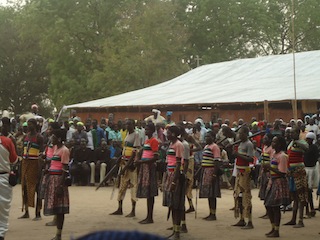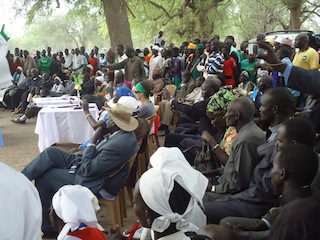South Sudan archbishop calls for peace in Bor
February 5, 2013 (BOR) – The archbishop of South Sudan, Daniel Deng Bull, has urged the people of Jonglei to live peacefully together, while condemning recent acts of tribal and inter-clan clashes.

“I strongly condemn the act of fighting in our communities. It [is] against the Christian values,” he told the crowd attending the ceremony.
Deng was the chairperson of the 21-member Jonglei peace committee, set up by president Salva Kiir last year to contain the spike in inter-communal violence that blighted South Sudan’s largest state throughout 2011 and early 2012, killing around 2,000 people and displacing over 100,000 people.
The impacts of the clashes, which were mainly between the Nuer and Murle tribes but also effected the Dinka,Anuak, Kachipo, and Jie ethnic groups are still being felt across the state.

In 2011, about 22 people were killed and many more were injured after violent clashes between the Dacuek and Ayual communities in Twic East.
Last month, two people died following a violent confrontation between members of the Deer and Koch communities in Makuach payam outside Bor town, with a further two people gunned down on 30 January in a suspected revenge attack.
In a bid to contain the cycle of violence, South Sudan’s army this month launched a second round of disarmament in Bor county.
A previous state-wide disarmament campaign was initiated last March following large-scale raids and counter raids, mainly between the Murle of Pibor county and other communities such as the Dinka and Nuer, have reportedly done little to curb ongoing tribal tensions, with killings by unknown assailants remaining a common occurrence.
Inter-clan fighting is typically sparked by land or border disputes, which remain among the major causes of misunderstanding.
SPECIAL COURTS TO SETTLE DISPUTES
In the state capital Bor, the government has established a special court comprising of a panel of judges and law experts from South Sudan, as well as chiefs of different payams (districts) in Jonglei, the acting governor and minister of local government, Diing Akol, revealed to Sudan Tribune on Monday.
“I think there must be a change because our people know that it is only through justice that one can get his right and this is the way that the constitution – whether the national or state constitution – is allowing every individual to express his grievances through the court,” he said.
Diing said the judges and the chiefs will be responsible for solving outstanding clan issues and conflicts through the special court “so that everybody will be satisfied at the end of the court”.
He said the establishment of the special court had been a long process, involving a direct request from the state governor to the president of the high court, allowing for the nomination of local chiefs.
After receiving the high court’s orders, Diing said he contacted all relevant parties to reach an agreement on those chiefs nominated to be members of the special court.
The special court began presiding over its first case on 4 January, involving the Kuai and Lith clans of Baidit payam in Bor county. A verdict will be announced after a series of hearings over the following days. Other cases are expected to be handled in a similar manner.
(ST)
